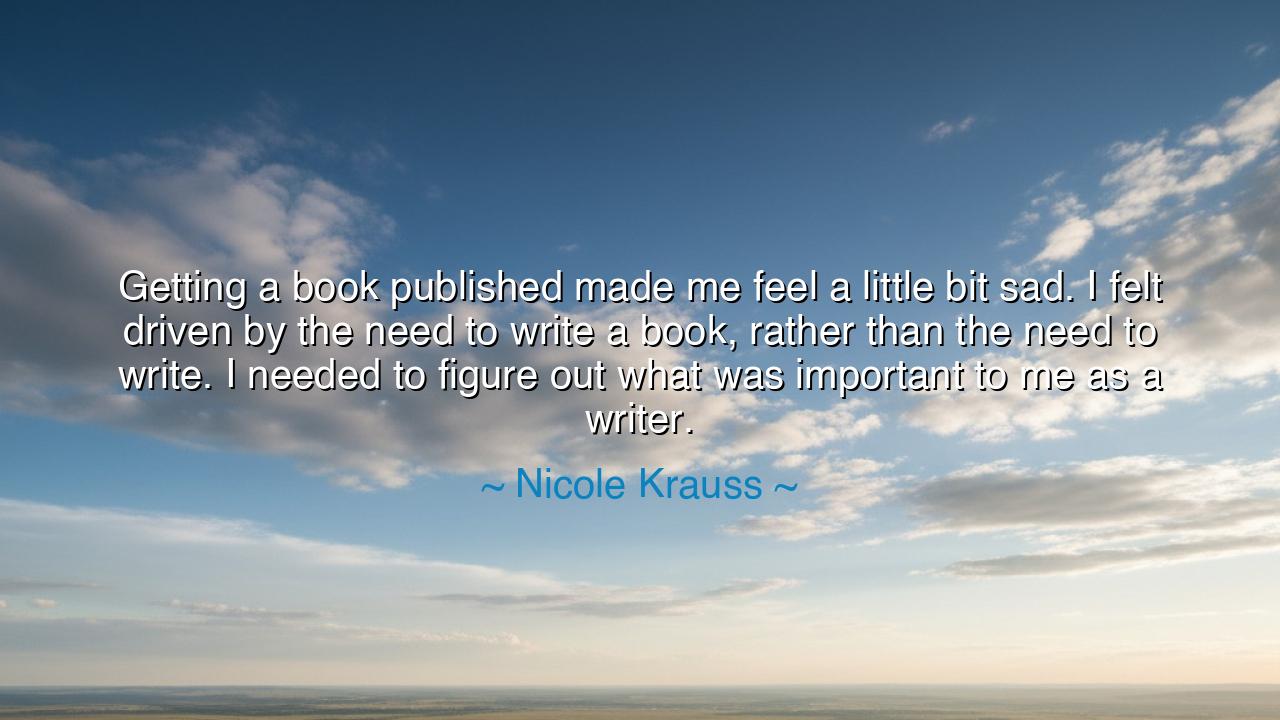
Getting a book published made me feel a little bit sad. I felt
Getting a book published made me feel a little bit sad. I felt driven by the need to write a book, rather than the need to write. I needed to figure out what was important to me as a writer.






Hear the words of Nicole Krauss, words filled with the weight of realization: “Getting a book published made me feel a little bit sad. I felt driven by the need to write a book, rather than the need to write. I needed to figure out what was important to me as a writer.” In this confession lies a profound truth about the artist’s journey—the tension between the demands of achievement and the pure impulse to create. It is a reminder that the pursuit of recognition, though natural, can overshadow the deeper calling that first led one to the craft.
To long for a book to be published is to yearn for completion, for validation, for proof that one’s work has weight in the world. Yet Krauss reminds us of the sorrow hidden in that moment: when the goal is the book itself, rather than the act of writing, the spirit grows restless. For the heart of a true artist is not satisfied by the object, but by the process—the daily practice of giving voice to thought, shaping it with care, and discovering truth along the way. To mistake the product for the purpose is to invite sadness, even in victory.
The ancients knew this tension well. Plato spoke of poets who sought only applause, who performed not to honor truth but to delight the crowd. Their work, though dazzling, was empty, for it lacked the soul of genuine inquiry. By contrast, the prophets and philosophers who sought wisdom for its own sake, whether praised or rejected, found a deeper fulfillment. Krauss’s lament belongs to this same lineage: she warns us that to chase only the appearance of accomplishment is to lose the living joy of the craft itself.
History provides us with many such examples. Consider Herman Melville, whose great work Moby-Dick was ignored in his lifetime. Had he written only to achieve fame, despair would have consumed him entirely. And indeed, sorrow touched him deeply. Yet he continued to write, because he was compelled by something greater than recognition—the urge to shape experience into story, whether or not the world was listening. His later recognition came too late for him to see, but his work endured because it was written from necessity, not vanity.
Krauss’s reflection is therefore a call to discernment: to ask oneself not merely, “What can I complete?” but “Why do I write at all?” For the answer to that question determines the soul of the work. The writer who writes only for the book will always feel empty when the book is done. But the writer who writes to explore, to reveal, to seek, will never be without purpose, for every sentence becomes a journey, every page an unfolding of meaning.
The lesson, then, is clear. If you are a creator—whether writer, painter, builder, or dreamer—guard your heart from the trap of external validation. Create first because you must, because the act itself is your nourishment. If recognition comes, let it be a byproduct, not the driving force. Ask yourself often what is truly important to you in your craft, and let that be your compass.
So let Krauss’s words stand as wisdom for the ages: that the goal of the artist is not to hold in their hand the finished book, but to live fully in the act of writing. The sadness she names is a gift, for it awakens us to the deeper truth: that joy lies not in the product, but in the practice. And those who embrace this truth will never run dry, for they will find meaning in every line, every effort, every attempt to give form to the mysteries of the heart.






AAdministratorAdministrator
Welcome, honored guests. Please leave a comment, we will respond soon